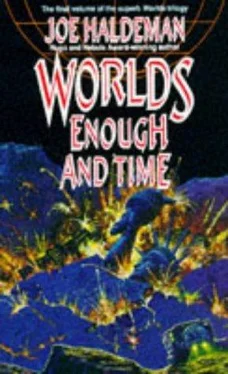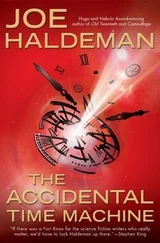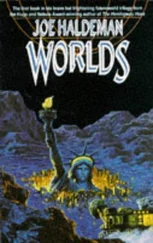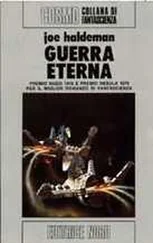Marsbound
1. Marsbound (2008)
2. Starbound (2010)
3. Earthbound (forthcoming)
Novels
Mindbridge (1976)
Tool of the Trade (1987)
The Long Habit of Living (1989) (aka Buying Time )
The Hemingway Hoax (1990)
The Coming (2000)
Guardian (2002)
Camouflage (2004)
Old Twentieth (2005)
The Accidental Time Machine (2007)
Collections
All My Sins Remembered (1977)
Infinite Dreams (1978)
Dealing in Futures (1985)
These three books are for Gay.
PRIME
O’Hara lived for another fourteen Earth years (thirty-one, Epsilon) after this entry, and they were reasonably happy and fruitful years, even after Charlee died. She wrote another volume of autobiography that was popular on several worlds, and for eleven years did an almost daily nostalgia-and-advice column called “Ask O’Hara,” which became a series of books.
It’s ironic that after her death, the income from her publications was willed to Skepsis, an organization devoted to debunking the supernatural—ironic because those same writings formed the basis for what has to be called a religion, Modern Numinism, that is still thriving, no longer modern, after two thousand years. It has several hundred million adherents, less than half of them human.
(Numinism is the reason that I myself faded into cyberspace a thousand years ago, and will disappear again as soon as this story is told. Adherents called me the “discarnation” of O’Hara and took up all my time with silly and embarrassing questions and demands.)
She might not have been too uncomfortable with Numinism, since it doesn’t require belief in gods, or even in her, though it accepts some things as transcendental, including certain aspects of her memory.
Not that she is worshipped, or considered infallible. She was wrong about fundamental things, though Numinists disagree over which things they were, which seems to make for a healthy religion. No one has yet been burned at the stake over a question of doctrine.
Along with everyone else during her lifetime, she was wrong about the basic nature of the eveloi. She had an inkling of the truth when she wrote this:
“The coincidence that the eveloi happened to be the dominant life form on the first planet we came to cannot be a coincidence. They are too central to the commerce/ intercourse/politics of all the hundreds of species in this corner of the Galaxy. It would be like landing on Earth at random and stepping out on the White House lawn or Ngoma Square.
“Epsilon Eridani was one of dozens of targets within range of Newhome . Some of the ones with reasonably comfortable planets, like BD 50, would have been real disasters because of the native life forms. If we had stopped there, we couldn’t have stayed. And we would not have had fuel to go on.
“We were steered here, somehow. The eveloi somehow were able to manipulate the mission planners long before the war, when the first drone probe was sent. When you confront them with that idea, though, they answer with evasive coyness.”
Like everybody, O’Hara had initially assumed that the eveloi were native to the planet because there were so many other, lesser, creatures that were obviously related to them. We know now that the predatory gasbags themselves had no more natural intelligence than an earthly squid, and just served as hosts for the eveloi, who are almost invisible nervous-system parasites—nomads that travel from world to world, borrowing appropriate bodies when necessary.
They had been spying on Earth for centuries, ever since the first radio wave announced civilization. They did steer humanity toward Epsilon, by invading the minds of the planners, because every other inhabitable world within Newhome’s range was already taken.
Their manipulation of spacetime still represents a challenge, or an affront, to the Grand Unification Theory. The eveloi are no help with that, claiming to be millennia beyond interest in mere physics. They also lie.
Every species that travels away from its home star encounters them, sooner rather than later. They claim to have destroyed four such species, for the protection of all others, and have taken individuals to view the blasted ruins of their home planets—always conveniently far away, so the worlds can’t be visited except on the eveloi’s terms.
What keeps everybody politely on their toes, or tentacles, is that the eveloi are vague about what criteria protect a race from their wrath, or make them call down doom. This is not an inability to communicate abstractions; they can be clear and specific when they want to be. Sometimes it seems almost a ghastly playfulness, or, as O’Hara said, coyness. “Just keep cooperating with one another,” they say, then “Maintain a healthy competitive relationship.”
They never discussed O’Hara’s inquisition while she was still alive. Centuries later, though, I was in communication with one of them on an unrelated matter, and it recognized who I was.
By this time we knew that the river of fire had not been an actual place; it was generated in O’Hara’s mind, out of her deepest fears. When she disappeared to the people around her, she was still there, simply displaced a molecule’s width through the dimension the eveloi use for space travel. The injuries she sustained there were also manufactured from her fears, carefully adjusted to maximize pain while still allowing her to survive.
The individual I was talking to remarked that O’Hara’s response in the second instance, when John Ogelby’s life was at stake, was in a sense “wrong,” though the evaluation was never a test, in the sense that you passed or failed it. The (c)valuator would have been in favor of her sacrificing her husband, since she did know that he wanted to die. Of course he wanted to avoid pain, too, but she knew better than anyone how short his pain would be. He was so fragile he wouldn’t have lived through a second of that terrible sensory overload.
So she traded the possibility of her own death, and the certainty of months of suffering, to spare herself the burden of a small guilt. The evaluator was not impressed.
The eveloi and I concluded our business and it went off to wherever it is they go. I found the experience immensely clarifying, and wished that O’Hara had lived long enough to share it.
I must tread carefully here, and not judge. I am human, after all, even if inorganic, and O’Hara’s response to that crisis has always seemed to me consistent with what I know about love, courage, self-sacrifice—and fear and guilt. I perforce had to admire her for it, especially after learning that she generated the terrible experience herself, as her own personal hell, but have always recognized that my approval was largely self-congratulation, and therefore trivial.
But the sacrifice was not illogical. O’Hara was never unaware of the ambiguity in simply rational terms, of her action. She had gone through it once before, with her daughter, and understood that surrendering to the pain was ultimately selfish, the way many or even most courageous acts must be: facing death or pain rather than face the prospect of living with the memory of your own cowardice.
I don’t suppose a race that effects social homeostasis via the planetwide extermination of species can afford this sort of moral delicacy, ambiguity. They can never be wrong. So their “evaluation” of O’Hara’s propriety, no matter how important to the survival of the human race, does not weigh heavily on me as her sister, or daughter, or only living relative. I have to agree with O’Hara: she was, later in life, both amused and appalled by the eveloi, because they were such a literal personification, almost a cartoon, of the gods that graced six thousand years of human history: omnipotent, capricious, bloodthirsty. And thickheaded.
Читать дальше












